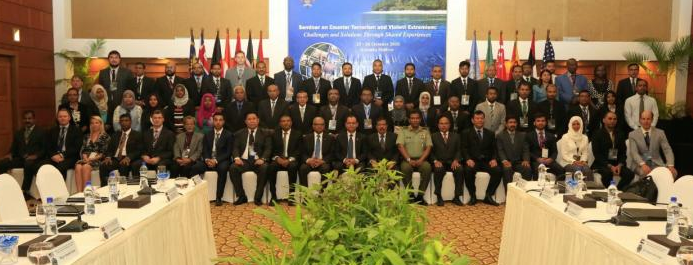
Male', 26 October 2016 ; Minister of Foreign Affairs Dr. Mohamed Asim has said that "international cooperation is the most important mechanism to counter terrorism and violent extremism". The Minister made this remark following the international seminar on "Counter Terrorism and Violent Extremism: Challenges and Solutions through Shared Experiences" that concluded today. The Seminar, which was held from 25-26 October 2016 in Kurumba Maldives, was organized by the National Counter Terrorism Centre of the Maldives, in association with United Nations, UN Women, and the Maldives Association of Tourism Industry (MATI).
"The threat of terrorism and violent extremism spread fear and hate, and threatens everyday lives of people across the globe. Domestic efforts alone cannot prevent this threat; it requires coordinated and concerted effort to effectively tackle the phenomenon. For this reason, bilateral and international cooperation and sharing of knowledge and expertise are essential in shaping national responses" Minister Asim said.
The two-day Seminar brought together a number of academicians, government officials and civil society representatives from 13 countries. It also featured guest speakers and experts with first hand operational experience on the subject. The key areas of focus in the Seminar included:
- Countering Terrorism and Violent Extremism through integration of instruments of national power;
- Crimes-terror nexus and role of intelligence in effectively countering terrorism and violent Extremism;
- Formulating national responses for countering Terrorism and Violent Extremism;
- Strategies and policies to safeguard the tourism industry from terrorism.
Dr Imtiaz Ahmed, Executive Director of Regional Centre for Strategic Studies of Bangladesh gave a keynote speech on the global and regional perspectives on terrorism and extremism. Ms. Dwi Rubiyanti Kholifah, Executive Director of Asian Muslim Action Network also gave the keynote speech in which she highlighted on the role of women in preventing violent extremism. Foreign Secretary Dr. Ali Naseer Mohamed moderated this session, which focused on formulating national responses.
Other speakers at the Seminar included:
- Brigadier General Zakariyya Mansoor, Director General, National Counter Terrorism Centre, Maldives - Counter terrorism and counter violent extremism: global and regional perspectives
- Professor Christopher C. Harmon, Daniel K. Inouye Asia-Pacific Center for Security Studies, United States of America - Trends in correlations between organized crime and terrorism
- Colonel Kevin Colyer, United States Pacific Command, United States of America – Role of Intelligence Fusion towards a Sustainable Counter Terrorism and Counter Violent Extremism Effort
- Mr. Deka, Joint Director, Government of India - 26/11 Terror incident and India's counter terrorism effort
- Mr. S. Krishnan, Deputy Director, Ministry of Home Affairs, Singapore – Best practices in terrorist rehabilitation: the Singapore Experience
- Mr. Lachemykanden Muniandy, Deputy Superintendent of Police, Division Head of Counter terrorism, Headquarters of Police, Malaysia – Counter Messaging as a tool to prevent radicalization
- Police Inspector General Petrus Reinhard Golose, Deputy of International Cooperation, National Counter Terrorism Agency, Indonesia - Soft target security: protecting tourists from the threat of terrorism
- Chief Inspector of Police Ahmed Ali, Maldives Police Service and Lieutenant Colonel Hassan Shahid, Maldives National Defence Force - Strategies and policies to safeguard tourism industry from terrorism
The seminar facilitated the exchange of ideas, experiences, and networking to seek solutions to the challenges faced. It identified concrete steps that countries can take in countering the threat and share experiences and best practices in designing responses.



